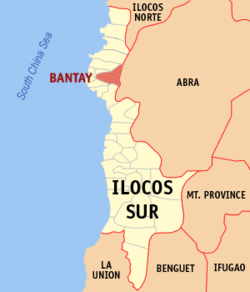Bantay
| Bantay | ||
|---|---|---|
| Municipality | ||
 |
||
|
||
| Motto: Dur-as Bantay (Progressive Bantay) | ||
 Map of Ilocos Sur showing the location of Bantay |
||
| Location within the Philippines | ||
| Coordinates: 17°35′N 120°23′E / 17.58°N 120.38°ECoordinates: 17°35′N 120°23′E / 17.58°N 120.38°E | ||
| Country | Philippines | |
| Region | Ilocos (Region I) | |
| Province | Ilocos Sur | |
| District | 1st District | |
| Founded | 1593 | |
| Barangays | 34 | |
| Government | ||
| • Mayor | Samuel G. F. Parilla II | |
| • Vice Mayor | William Argel Pre | |
| Area | ||
| • Land | 76.60 km2 (29.58 sq mi) | |
| Elevation | 100 m (300 ft) | |
| Population (2015 census) | ||
| • Total | 35,731 | |
| Demonym(s) | Bantayeño | |
| Time zone | PST (UTC+8) | |
| ZIP code | 2727 | |
| IDD : area code | +63 (0)77 | |
| Income class | 3rd class (1st class on 2013) | |
| Languages | Ilocano, Tagalog, and English | |
| Website | www |
|
Bantay is a municipality of Ilocos Sur, Philippines, situated just north-east of Vigan, the Provincial Capital. According to the 2015 census, it has a population of 35,731 people.
Traversed via the Manila North Road, Bantay is 137 kilometres (85 mi) north of San Fernando City, La Union, the Regional Capital of Ilocos Region, and 406 kilometres (252 mi) from the City of Manila, the Nation's Capital.
Bantay has an average elevation of 100 meters (328.08 feet), with a land area of 7,660 hectares (18,900 acres). It is bounded by Vigan City and the municipalities of Caoayan, San Vicente, Santa Catalina, Sto. Domingo, and Magsingal, Ilocos Sur; and San Quintin in the neighboring province of Abra. It is an elevated and hilly municipality but some barangays, especially those near creeks, are being flooded during heavy typhoons.
Bantay is politically subdivided into 34 barangays.
Bantay's reserved forests and farms make it home to a diverse range of plants, animals, and river creatures. Around more than 60 species can be found in Bantay including over 9 mammal, reptile (including monitor lizards), and amphibian species; 10 bird and fish species; several insects and plants are existing in the farms and wild.
Typical of places all over the Philippines, cattle and water buffalo are domesticated. Herons are often sighted in rice paddies, and beetles (especially the "aros-aros" and the "abal-abal") and crickets come seasonally. Mudfish, carp, the Abra River eel, and other fish abound in its rivers and creeks, most of which are also seasonal. Monkeys, wild boar, and wild chickens can be seen in the mountains, but not as plentiful as before.
...
Wikipedia


